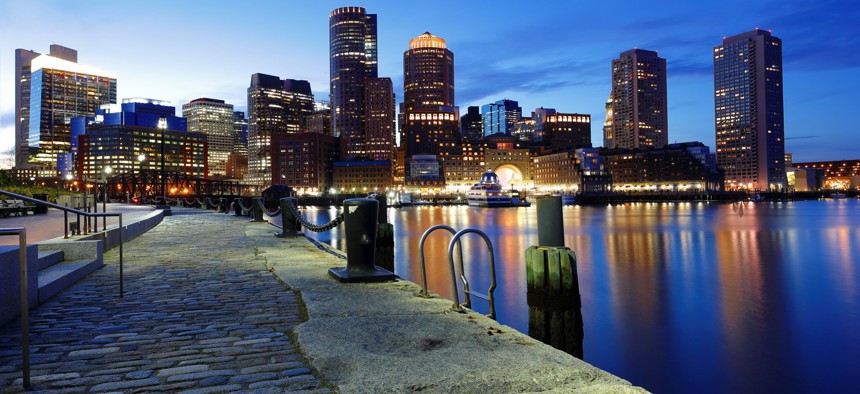Connecticut’s GE Loss is Boston’s ‘Powerball’ Gain

The Boston waterfront will be getting a new major Fortune 500 company headquarters: General Electric. Jay Yuan / Shutterstock.com

Connecting state and local government leaders
The Fortune 500 leader had threatened to leave the Nutmeg State. Now we know where the company will end up.
Boston Mayor Marty Walsh is feeling lucky following General Electric Co.’s Wednesday announcement that it’s shipping up to the city’s Seaport District.
“We won the powerball here in Boston by having GE come,” Walsh said at a press conference, according to Boston.com.
It’s hard to argue with him, given the Fortune 500’s eighth-most valuable brand is bringing about 800 jobs to Beantown—the biggest relocation in city history by the state’s soon-to-be largest publicly traded company.
The digital industrial giant first threatened to leave its Fairfield, Connecticut, headquarters in June, citing corporate tax increases intended to right the Nutmeg State’s budget.
So-called “Taxachusetts” offered GE an incentives package valued at up to $120 million, The Boston Globe reported, on top of a municipal offering of up to $25 million in property tax relief—dependent upon which neighborhood the HQ is sited in.
GE paid about $1.8 million in taxes last year to Fairfield on the property it plans to sell, reported the Connecticut Post, and Connecticut was ranked 44th for business tax climate by D.C.-based think tank The Tax Foundation, compared to Massachusetts’ 25th place.
“We had enough on the table to be competitive,” Jay Ash, Massachusetts’ secretary of economic development, told the Globe. “[But] the ecosystem that we have here in Massachusetts to support innovation is what won us this prize.”
In the past decade, the city’s Seaport District was transformed from a mess of shipping facilities and parking lots into an innovation district for startups that, for instance, welcomed Vertex Pharmaceuticals in 2014 to an $800 million, 1.1 million square foot headquarters complex.
GE’s move will be completed in 2018, leaving Connecticut to ponder its economic development strategy that will soon be missing one of its most important companies.
“We want to be at the center of an ecosystem that shares our aspirations,” Jeff Immelt, GE’s chairman and CEO, said in the company’s announcement. “Greater Boston is home to 55 colleges and universities. Massachusetts spends more on research & development than any other region in the world, and Boston attracts a diverse, technologically-fluent workforce focused on solving challenges for the world.”
RELATED on Route Fifty: “Examining the Role of the Public Sector in Developing Boston’s Innovation District”
Dave Nyczepir is a News Editor at Government Executive’s Route Fifty.

NEXT STORY: FirstNet RFP released





